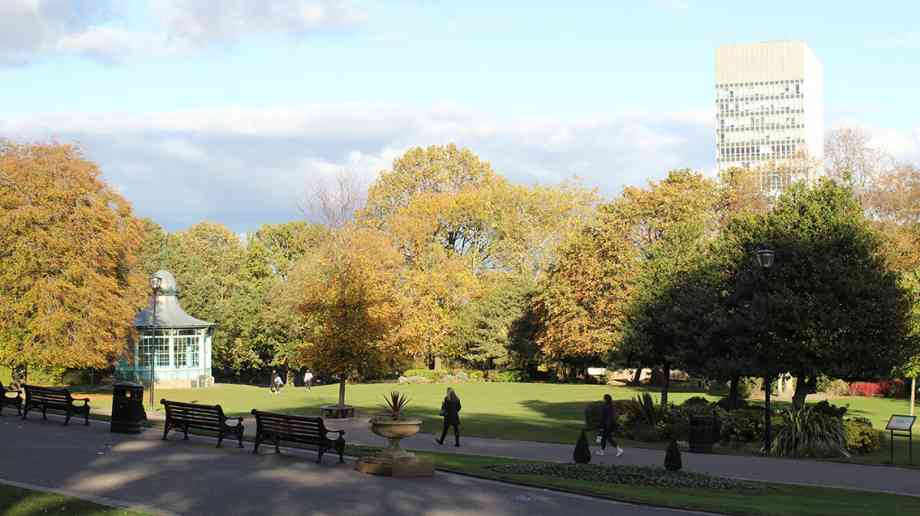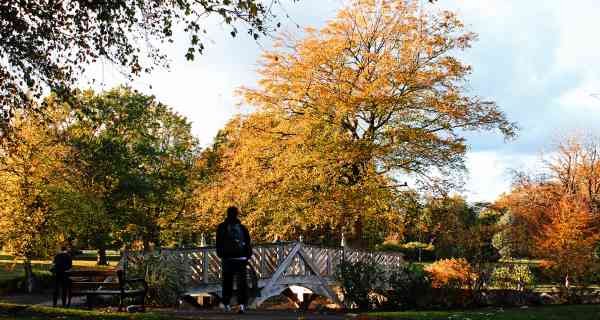Sue Robb of 4Children talks to Julie Laughton and Alison Britton from the Department for Education about the role of childminders in delivering the 30 hours free entitlement.

The Green Space Index: Mapping health benefits
Green spaces are good, do good and need to be protected for good. Alison McCann, policy manager at Fields in Trust, explains why
There is overwhelming evidence that parks and green spaces contribute health and well-being benefits for people who use them regularly; Fields in Trust is an active participant in developing this evidence base. Our 2018 research report Revaluing Parks and Green Spaces concludes that targeted spending on parks and green spaces can help to improve the health of the nation and reduce future NHS expenditure. Fields in Trust is well placed to share expertise about the value of parks, as a registered charity dedicated to championing and supporting our green spaces by protecting them for people to enjoy in perpetuity. Founded in 1925, we have over 90 years’ experience of legally protecting publicly accessible recreational land.
Our research shows that parks and green spaces deliver over £34 billion of direct health and well-being benefits to UK residents each year. This means people who use parks regularly enjoy a greater life satisfaction including improved physical and mental health. Our research used HM Treasury approved Green Book methodology and demonstrates that access to parks and green space makes a net contribution to the exchequer by improving public health and well-being; reducing GP visits and NHS spending by a total of £111 million each year.
Green Space Index
Yet parks are a discretionary service which, unlike libraries or waste collection, councils have no statutory duty to provide. Therefore, public green spaces, and the direct and indirect benefits they provide to people and the environment, are not equally distributed. Concerned that people who don’t have a park or green space nearby could miss out, we undertook a comprehensive analysis of green space provision using new Ordnance Survey data. Our Green Space Index reveal that over 2.5 million people across Great Britain live more than a ten-minute-walk from a park or green space.
Although Great Britain has a total of 216,160 hectares of publicly accessible local parks and green spaces (about one and a half times the size of London), less than six per cent of this space is legally protected with Fields in Trust. With public sector cuts leading to pressure on parks and green spaces, there is a risk that a lack of legal protection could lead to more being sold off or developed. It is also likely that any future loss of parks and green spaces will disproportionately impact disadvantaged and underrepresented communities. Fields in Trust campaigns for the urgent need to protect and maintain existing parks and green spaces and want local government and landowners to take steps to legally protect the ones they own.
The Green Space Index ranks Britain’s regions and nations against a minimum standard of provision which finds that London, Yorkshire and the Humber, the North West and the North East regions all fall well below the minimum level, with the East Midlands providing exactly the minimum. In contrast Scotland tops the Green Space Index. It both provides more green space per person than any other part of in Great Britain (45.86 square metres per person) and also has the most legally protected green space (2,143 hectares). The average amount of green space per person in Great Britain is just over 35 square metres, less than half the size of a six-yard box on a football pitch.
Westminster Government parks policy
Following a Parliamentary inquiry into the Future of the UK’s Parks in 2016, the government convened the Parks Action Group of sector experts to advise MHCLG. However, we are now on our fourth Parks and Green Spaces Minister since the Inquiry with limited progress. Having said that departments across Whitehall have repeatedly referenced the importance of parks and green spaces in delivering a diverse range of policy goals.
DEFRA’s 25-year plan (2018), published under Michael Gove’s tenure, includes proposals to improve air and water quality, enhance wildlife habitats and connect people with green spaces to improve health and wellbeing. The plan recognises the need to focus on disadvantaged areas. With Theresa Villiers taking over DEFRA we await to see if these long-term commitments are to be continued.
Matt Hancock published the Department for Health’s consultation on the preventative health agenda on the eve of the Boris Johnson’s premiership and Hancock continues in post to deliver it. Parks and green spaces are directly referenced as 'assets for good health' in the document alongside other community infrastructure. The consultation also identifies 'access to good quality green spaces', as one of the 'protective factors that can act as a strong foundation for good mental health'. If, as encouraged, people are to take personal responsibility for their own physical and mental health, then the provision of parks and green spaces in which to exercise and relax are a prerequisite.
The government’s Childhood Obesity Plan (2018) references 'limited access to green spaces' as a contributory cause and encourages local authorities to 'ensure access to quality green space to promote physical activity'. Parks and green spaces are also cited in the Social Mobility Commission report An Unequal Playing Field (2019) which highlights disparities in children’s participation rates in extra-curricular activities The loss of parks and green space provision due to austerity is noted in the report which states they 'represent the necessary structures to give young people the opportunity to take part in activities'. The Commission identify the loss of public provision as having a significant impact on the most vulnerable communities. Work on building childhood resilience, begun under Damian Hinds as Education Minister is expected to continue with new minister Gavin Williamson – another policy area requiring access to parks and green spaces for independent outdoor play.
The value of parks and green spaces is referenced in DCMS’s Civil Society Strategy (2018), as well as their Connected Society (2018) plan where the value of parks in tackling loneliness is discussed. MHCLG’s Integrated Communities Action Plan (2019) and a recent policy paper, By deeds and their results: how we will strengthen our communities and nation (2019) sets out future work across government to strengthen communities, and identifies the importance of parks and green spaces as places where people can meet, mix and strengthen local connections. Whatever the final outcome of Brexit, the need to support inter-community engagement has rarely been greater.

Joined-up aspirations
Joining-up these diverse aspirations across government and recognising and resourcing the range of social policy goals that the green space sector is tasked with delivering could genuinely bring about some stability to long-term funding of parks and green spaces, commensurate with their impact. If more money is to be made available for public services, we believe that it would be financially efficient to channel this investment into social infrastructure that supports the preventative health agenda and reduces the need for more expensive and intensive interventions further down the track. Recent research from the New Policy Institute indicates that councils are actually having to shift funding away from preventative agendas because of a ‘quiet crisis’, whereas we know that is not a cost-effective decision in the long term. Clearly local authorities across the UK are facing difficult choices about which local services should be prioritised. We believe cutting parks budgets is a false economy. Any decision by a public body to remove a park or green space is completely short-sighted which will be likely to cost more money than is saved.
It is vital that such far-reaching decisions are based on the best evidence and our research reveals what we all intuitively know, green spaces are good, do good and need to be protected for good.
Alison McCann is Fields in Trust's policy manager. Having worked for the organisation for the last seven years, Alison's current role focuses on research about the value of green space to better inform policymaking, as well as overseeing the legal support function for sites protected with Fields in Trust.
Alison led the commissioning, data analysis and report production for Fields in Trust's Revaluing Parks and Green Spaces research published in May 2018. Along with other sector professionals Alison represents Fields in Trust on the Parks Action Group to advise Government about a sustainable future for England’s public parks.
Alison also represents Fields in Trust on the School Playing Fields Advisory Panel providing the Secretary of State with independent objective advice. Alison previously worked in Sports Development for two London Boroughs, managing projects with a range of stakeholders and community groups.
Company Focus
Located in Bromley, Japanese Knotweed Eradication Ltd has been providing solutions in the treatment and removal of Japanese Knotweed (Fallopia Japonica) for over a decade. During this time we have mastered a repertoire of methods, from herbicidal treatments to landscaping solutions, tailored to address the unique challenges our clients face with this pervasive weed.
Event Diary
UKREiiF has quickly become a must-attend in the industry calendar for Government departments and local authorities.
The multi-award-winning UK Construction Week (UKCW), is the UK’s biggest trade event for the built environment that connects the whole supply chain to be the catalyst for growth and positive change in the industry.
Supplier Profiles
Geo Energy
At GeoEnergy Design, we're on a mission to disrupt the traditional way heating and cooling ha
Latest Features
Professor Harith Alani, director of the Knowledge Management Institute at the Open University explains how AI can be used for good and bad.
Alex Lawrence, head of health & social care, techUK sets out techUK’s Five Point Plan for CareTech.












